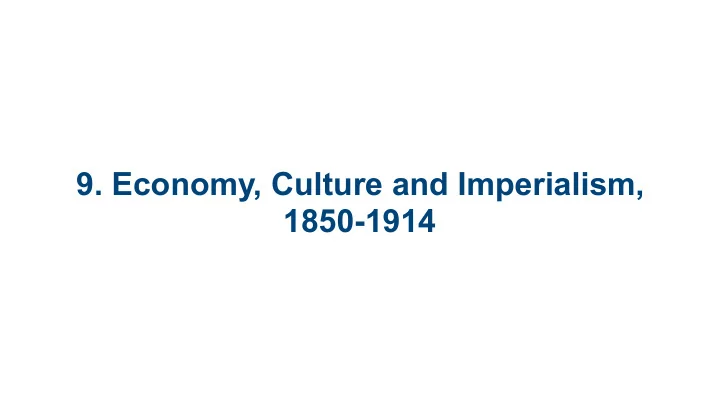

9. Economy, Culture and Imperialism, 1850-1914
9.1 Demography 9.2 World Economy of the Nineteenth Century 9.3 Technological Developments 9.4 Science, Philosophy and the Arts 9.5 Imperialism in Africa and Asia
9.1 Demography
Demographic Trends • Population Increase • Medical improvements • Fertility Crisis • Migration: USA and Empire
9.2 World Economy of the Nineteenth Century
World Economic Trends • Capitalism • Imperial Possessions • Second Industrial Revolution
Imperialism • New Motive • Africa • Asia • “Development” > Trade
First Industrial Revolution • 1740-1850s • Steam • Iron • Textiles
Second Industrial Revolution • 1850s-1950 • Electricity • Steel • Chemicals
9.2.1 Mercantilism to Capitalism
• A shift from the principles of mercantilism to capitalism. • Mercantilism is typified by the idea of all the wealth of the world is in one circle. • Trade is zero sum • Trade benefits the mother country • The real goal behind all of this is to acquire money
• In capitalism we have a different view of the world. • The view of wealth is transformed. • Wealth is relative, not absolute. • Free trade also means little role for government. • Moving from trade as a zero sum gain to trade being mutually beneficial • The purpose of money was about acquisition
9.3 Technological Developments
Second Industrial Revolution • 1850s-1950 • Electricity • Steel • Chemicals
Steel • Bessemer Process • Eiffel Tower • Railway Stations • Steamships • Machine Guns
9.4 Science, Philosophy and the Arts
Science • Charles Darwin • On the Origin of Species • Albert Einstein and Relativity
“Science” • Social Darwinism • Herbert Spencer • Eugenics
Philosophy • Higher Criticism • Social Gospel • Friedrich Nietzsche • On the Genealogy of Morality
Arts • Picasso and Cubism • James Joyce and Ulysses • T.S. Elliot The Waste Land • Rites of Spring • Arnold Schoenberg
Arts • Picasso and Cubism • James Joyce and Ulysses • T.S. Elliot The Waste Land • Rites of Spring
9.5 Imperialism in Africa and Asia
“New Imperialism” • 1830-1914 • New Powers • New Purpose
Tools of Empire • Steamships • Telegraph • Quinine • Maxim Gun
Asia • French Indochina • British India – Opium – British East India Company • Opium Wars
Imperialism in Africa • Algeria (1830) • Suez Canal (1869) • Berlin Conference (1885) • “Scramble for Africa”
Meaning of Imperialism • Social Darwinism • Hierarchy of Races • G.F.W. Hegel
Take up the White Man's burden, Send forth the best ye breed Go bind your sons to exile, to serve your captives' need; To wait in heavy harness, On fluttered folk and wild — Your new-caught, sullen peoples, Half-devil and half-child.
Take up the White Man's burden, In patience to abide, To veil the threat of terror And check the show of pride; By open speech and simple, An hundred times made plain To seek another's profit, And work another's gain.
Recommend
More recommend